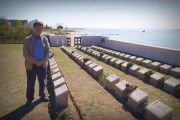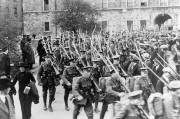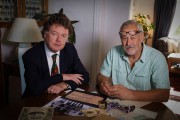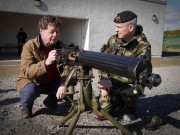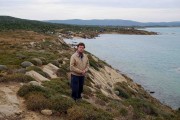They hadn’t a hope; the young Irishmen in their thousands who entered the deathtrap that was Gallipoli as part of the Allied failed invasion of Turkey during WWI. Today, many lie in unmarked graves which are strewn across this foreign rugged landscape – their memories neglected for far too long.
In this heartbreaking story of bravery, tragic loss and forgotten history , RTÉ’s Political Correspondent David Davin-Power returns to that rural Turkish peninsula which claimed the lives of some 3,000 Irishmen. With the help of historians and relatives of soldiers, he tells the story of this brutal battle and disastrous campaign from the Irish perspective one hundred years on.
David’s own grandfather, Jack Power from Kimmage was one of the lucky ones who returned, even though, like many others ‘he became a prey to drink’. Ronan Lee talks about his grand-uncle, a young rugby player who volunteered with his pals and thought he was heading for ‘a great adventure’ but ended up being killed along with many of his friends; brother and sister Jim and Mai Carey talk of their grand-uncle who left their family’s Tipperary cottage to emigrate to Australia for a better life but ended up signing up for the Anzacs and losing his life in his first couple of days of fighting.
Conceived by a young Winston Churchill, the Gallipoli campaign is considered to be one of the most disastrous campaigns in military history. In 1915 the stalemate on the western front prompted an alternative approach to defeating Germany. The idea was simple; launch an Eastern Front Campaign by forcing the straits known as the Dardanelles, capture Constantinople (Istanbul), force the Ottomans out of the war and attack Germany from the East.
The casualties on both sides were catastrophic – regular soldiers but mostly young volunteers. Unlike the Australian and New Zealand troops for whom Gallipoli became a touchstone of their nationhood, the British chose not to remember such a shameful disaster – and for the Irish, political revolution back at home brought deep bitterness for those who served in the British forces and Gallipoli was wiped from memory until very recent reawakenings. One popular Irish ballad at the time told the volunteers, ‘You fought the wrong country; you died for the wrong cause, when the greatest war was at home’. As recently as 2010, President Mary McAleese was at the forefront of honouring those who died as she made her own personal pilgrimage to Gallipoli. For many who died in the first world war, she said, their memories had been brought home to Ireland and ‘put in shoe boxes in the attic because of the vanities of history’.
Taking part in this documentary are historians Professor John Horne (Trinity College Dublin), Dr Heather Jones (London School of Economics), Philip Orr (author ‘Field of Bones’), Oliver Fallon (Connaught Rangers Association), Tom Burke (Chair, Royal Munster Fusiliers Society), Lar Joye (Curator of Military History at Collins Barracks), Dr Jeff Kildea (who tells the story from an Australian perspective), Altay Cengizer (Turkish Ambassador to Ireland 2009-2013) as well as relatives of the soldiers and volunteers.
